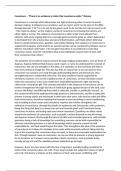Conscience – “There is no evidence to claim that conscience exists.” Discuss.
Conscience is a concept which determines our right and wrong when it comes to moral
decision making. It influences our emotions, such as regret, and it can be seen in the Bible
through Romans 7:19 “For I do not do the good I want to do, but the evil I do not want to do
– this I keep on doing”, as this implies a sense of conscience in knowing that actions are
either right or wrong. The existence of conscience is often under much debate from
ethicists, with some arguing that it is a concept given by God to guide us, others believing it
is developed from the unconscious and social indoctrination, and finally others believing
that it is simply behaviourism, genetics, and wishful thinking. The existence of conscience is
supported by Aquinas and Freud (to an extent) but this can be countered by thinkers such as
Skinner, Feuerbach and Pavlov. I do not agree that there is no evidence to claim that
conscience exists, however I do believe that some individuals may be more in tune with
their conscience than others.
The existence of conscience may be present through religious explanations, such as those of
Aquinas. Aquinas believed that humans used reason, or ratio, to understand the concept of
conscience. We can see strengths in this idea, as it separates us from animals and links to
how God created us imago dei. This also has links to natural law as we can observe how
conscience can connect us to God through understanding divine and eternal law, thus
strengthening one’s relationship with God. This idea would be heavily supported by
Christians; however, it is not the traditional view of conscience, as most Christians would
claim that conscience is the voice inside their head differing between right and wrong,
rather than a God-given gift. This concept and belief in the existence of conscience can be
further strengthened through the idea of individuals going against the law of the land, such
as Jesus the Rebel, and differing from what is culturally, socially, or politically ‘normal’, as
this cannot be effectively explained through genetics or behaviourism, and this is especially
present in young adults and individuals in their later teen years, who tend to rebel and differ
from social norms, therefore implying that humans act not according to social conditioning,
but according to their reason and conscience. Aquinas also further strengthens the
existence of conscience, through the details on synderesis and Conscientia, with synderesis
being the thing that directs us away from evil and towards good, and Conscientia being
conscience in action, and acting upon your moral conscience. Questions are often raised
towards the existence of conscience, such as people’s actions deemed as morally wrong,
and Aquinas answers this through the idea of vincible and invincible ignorance, with vincible
ignorance being a lack of knowledge for something a person can be held responsible for,
whereas invincible ignorance is a lack of knowledge which someone cannot be held
responsible for, and God would forgive the latter. This strengthens the idea of the existence
of conscience as it allows for mistakes to be made within humanity without falling into the
trap of this meaning that conscience does not exist, as there are reasonable explanations for
this. Through Aquinas’ view on conscience, we can see that he presents a strong argument
for its existence as it answers many questions about conscience, such as people doing
morally wrong acts and the rebellious phases individuals go through.
However, there are clear issues with this line of argument, possibly leading an ethicist to
believe that conscience does not exist. These issues include the subjective nature of ‘good’
and ‘evil’, the theory’s reliance on the existence of God, and reason conflicting with




